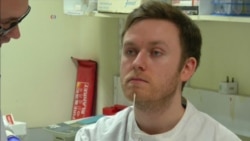Widespread use of antibiotics for conditions that don't require them has spurred mutations in bacteria strains, turning them into so-called superbugs.
As a result, some of the diseases that once were easily treatable with antibiotics, such as pneumonia and kidney infections, are becoming deadly again. But a recent lab test in Britain showed that men's facial hair is teeming with a variety of bacteria, all fighting for survival. Some of them produce substances with antibiotic properties.
"So from 20 beards we managed to isolate at least a hundred different isolates from them, and around 25 percent of these showed antibiotic activity against our indicator strain,” said Adam Roberts, senior lecturer in microbial diseases at University College London.
The research at University College London was spurred by media reports saying that there are more germs in a man's beard than on a toilet seat. These sparked a debate on whether beards are good or bad for men's health.
"We wanted to either disprove or prove that that was actually correct, and we could find no evidence of that. So we have no real conclusion to say that beards are bad for you. Likewise, we can't really say that they're good for you,” Roberts said.
Drug-resistant strains
But the tests showed that certain species of bacteria produce toxins that kill other bacteria, in one case even a particularly drug-resistant strain of E. coli, which can cause deadly diseases.
The finding is crucial at a time when existing antibiotics are less and less effective, and new ones have not been discovered. Scientists say they are testing bacteria from various sources.
"So we don't need any more beards. And we've got other samples from all over the country -- from child's trampolines, to fridges, to cats. We've now got a selection of around 50 different bacteria which can kill multiple indicator strains,” he said. “These include E.coli -- a multi-drug-resistant E.coli -- from a urinary tract infection. These include also Candida albicans [yeast infections] and MRSA [Methicillin-resistant Staphylococcus aureus]."
But don't expect a new miracle drug anytime soon. Scientists warn that properly testing and purifying a novel antibiotic is a long and expensive process, riddled with failures.





